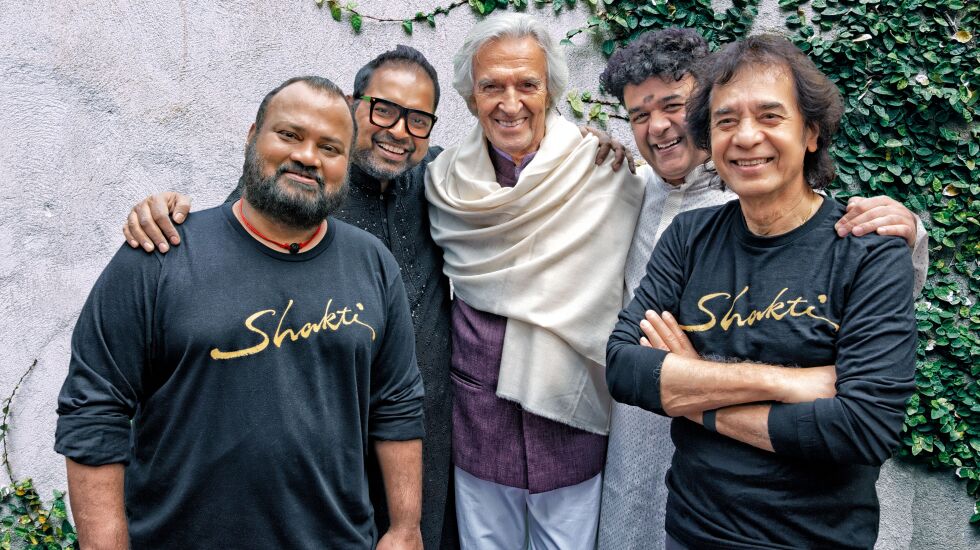
The current tour by the quintet Shakti, which arrives at Ravinia on Sunday, marks another important chapter in the musical journeys of John McLaughlin, 81, and Zakir Hussain, 72.
McLaughlin, a British jazz guitarist, and Hussain — a native of Mumbai who plays the Indian hand drums called the tabla — both are revered as top practitioners of their respective instruments.
The current lineup of Shakti also includes vocalist Shankar Mahadevan, violinist Ganesh Rajagopalan and percussionist Selvaganesh Vinayakram. The band, which toured India and Europe earlier this year, is on the road to celebrate its 50th anniversary and to promote a dazzling new studio album, “This Moment.”
Shakti has earned acclaim for its “East meets West” aesthetic, blending McLaughlin’s jazz sensibility with Indian musical traditions and instrumentation.
“With Shakti, there’s a wonderful spirit of freedom and joy and happiness,” McLaughlin said during a call from his home in Monaco. “It’s just a joyful band. I think that’s why it’s still here 50 years later. Every night, when we sit down to play, we’re thrilled.”
Hussain echoed that sentiment during a video chat from his home in Marin County, California.
“The core element, when it comes to Shakti, whether it’s 1973 or 2023, is joy,” Hussain said. “It’s such a blessing to still feel that love, to still experience that ecstasy and that moment of high flying and diving into a pool from a thousand feet above.”
A key reason for the band’s success has been McLaughlin’s deep commitment to learning Indian musical forms.
On Shakti’s new album, all five musicians utilize konnakol, the Southern Indian tradition of spoken percussion. Because all the members know konnakol, the group frequently rehearses without any instruments, working out arrangements just by communicating through spoken rhythmic patterns.
“Once you know the [konnakol] system, you can follow it, and you can understand the amazing things that these guys do spontaneously, mathematically, but in living rhythm,” McLaughlin said. “You hear the mathematics, but it’s a beautiful, sensuous rhythm at the same time. So, you’ve got the intellectual satisfaction and you have the physical satisfaction because it’s very sensual what they’re doing, how they’re playing.”
McLaughlin, known for his intricate fretwork, won early fame as an accompanist for trumpeter Miles Davis. Then in 1971 the guitarist formed his own groundbreaking jazz-fusion group, the Mahavishnu Orchestra, which reflected his interest in Indian music.
During recent concerts, Shakti has been playing the tune “Bending the Rules,” a mesmerizing jolt of sonic complexity that illustrates each musician’s technical prowess. Another standout track on “This Moment” is “Las Palmas,” which contains handclaps, violin riffs and sonic elements that might appeal to fans of “Friday Night in San Francisco,” the landmark 1981 concert album that McLaughlin recorded with fellow guitarists Al Di Meola and Paco de Lucía.
Fans who consider Hussain to be the world’s greatest tabla player might assert that such a lofty title previously belonged to his late father, Alla Rakha, who played in the band of iconic sitar master Ravi Shankar.
Over the decades, the versatile McLaughlin has studied Indian music with numerous maestros, including Shankar and Hussain.
“John is a unique animal on this planet,” Hussain said. “As far as I’m concerned, he’s a mutant, an incredible X-Man. There are musicians who excel at that [style] which they grew up with, whether they are a blues guitarist or a jazz guitarist, or a rock guitarist or a flamenco guitarist, or whatever. John is this incredible human being and artist who can wear any hat.”
Both McLaughlin and Hussain credit Beatles guitarist George Harrison for helping introduce Western audiences to Indian music. One of Harrison’s key vehicles for that goal was “The Concert for Bangladesh,” which was actually a pair of all-star benefit concerts in 1971 that were documented with a film and a Grammy-winning triple album.
In addition to rock stars like Eric Clapton, Bob Dylan and Ringo Starr, the lineup for those New York City concerts featured Shankar’s band, which included Rakha and sarod player Ali Akbar Kahn. (Hussain, then serving as his father’s roadie, watched the concerts from backstage at Madison Square Garden.)
“George did a fantastic thing there,” McLaughlin said. “He really built a bridge between East and West. Ravi [Shankar], Alla Rakha and Ali Akbar Kahn were already building bridges, but George built a big one. With that movie, we could all cross it and get to the other side, and see the beauty and magic of Indian musical culture.”







